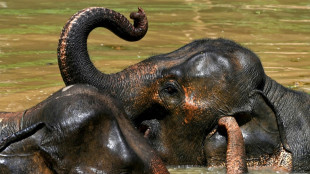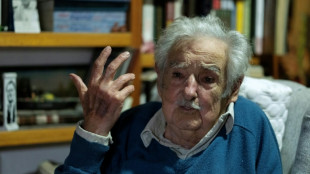
-
 Icelanders head to the polls after government collapse
Icelanders head to the polls after government collapse
-
England strike twice to have New Zealand in trouble in first Test

-
 Researchers analyse DNA from dung to save Laos elephants
Researchers analyse DNA from dung to save Laos elephants
-
North Korea's Kim, Russian minister agree to boost military ties

-
 Brook's 171 gives England commanding 151-run lead over New Zealand
Brook's 171 gives England commanding 151-run lead over New Zealand
-
Kamala's coda: What's next for defeated US VP Harris?

-
 Chiefs hold off Raiders to clinch NFL playoff berth
Chiefs hold off Raiders to clinch NFL playoff berth
-
Australia's Hazlewood out of 2nd India Test

-
 Trudeau in Florida to meet Trump as tariff threats loom
Trudeau in Florida to meet Trump as tariff threats loom
-
Jihadists, allies breach Syria's second city in lightning assault

-
 Trudeau in Florida to meet Trump as tariff threats loom: media
Trudeau in Florida to meet Trump as tariff threats loom: media
-
Hunter shines as Hawks top Cavs again

-
 Southampton denied shock Brighton win by dubious VAR call
Southampton denied shock Brighton win by dubious VAR call
-
Alarm over high rate of HIV infections among young women, girls

-
 Swiss unveil Euro 2025 mascot Maddli
Swiss unveil Euro 2025 mascot Maddli
-
Bears fire coach Eberflus after latest agonizing NFL defeat

-
 Rallies mark one month since Spain's catastrophic floods
Rallies mark one month since Spain's catastrophic floods
-
Arnault family's Paris FC takeover completed

-
 Georgian police stage new crackdown on pro-EU protestors
Georgian police stage new crackdown on pro-EU protestors
-
'We're messing up:' Uruguay icon Mujica on strongman rule in Latin America

-
 Liverpool dealt Konate injury blow
Liverpool dealt Konate injury blow
-
Van Nistelrooy appointed Leicester manager

-
 Verstappen brought back to earth in Doha after F1 title party
Verstappen brought back to earth in Doha after F1 title party
-
Global wine output to hit lowest level since 1961

-
 Norris boosts McLaren title hopes with sprint pole
Norris boosts McLaren title hopes with sprint pole
-
Big-hitting Stubbs takes satisfaction from grinding out Test century

-
 Romania recounts presidential ballots as parliamentary vote looms
Romania recounts presidential ballots as parliamentary vote looms
-
French skipper Dalin leads as Vendee Globe passes Cape of Good Hope

-
 Chelsea not in Premier League title race, says Maresca
Chelsea not in Premier League title race, says Maresca
-
Brazil's Bolsonaro aims to ride Trump wave back to office: WSJ

-
 France requests transfer of death row convict held in Indonesia: minister
France requests transfer of death row convict held in Indonesia: minister
-
'Mamie Charge': Migrants find safe haven in Frenchwoman's garage

-
 Iconic Uruguayan ex-leader hails country's swing left as 'farewell gift'
Iconic Uruguayan ex-leader hails country's swing left as 'farewell gift'
-
Thousands rally in Georgia after violent police crackdown on pro-EU protesters

-
 Shared experiences make Murray 'perfect coach', says Djokovic
Shared experiences make Murray 'perfect coach', says Djokovic
-
Iran, Europeans to keep talking as tensions ratchet up

-
 Inflation-wary US consumers flock to 'Black Friday' deals
Inflation-wary US consumers flock to 'Black Friday' deals
-
France shows off restored Notre Dame after 'impossible' restoration

-
 South African bowlers strike after Sri Lanka set big target
South African bowlers strike after Sri Lanka set big target
-
Namibia reopens polls after election chaos in ruling party test

-
 Georgia police arrest dozens in clashes with pro-EU protesters
Georgia police arrest dozens in clashes with pro-EU protesters
-
US stocks rise on Black Friday

-
 Leclerc on top for Ferrari in Qatar GP practice
Leclerc on top for Ferrari in Qatar GP practice
-
Jihadists, allies enter Syria's second city in lightning assault

-
 Amorim puts faith in Mount to turn around Man Utd career
Amorim puts faith in Mount to turn around Man Utd career
-
Guardiola will not 'run' from Man City rebuild

-
 Assisted dying campaigners, opponents rally at UK parliament
Assisted dying campaigners, opponents rally at UK parliament
-
Durable prop Healy set to carve name in Irish rugby history

-
 Macron unveils Notre Dame after 'impossible' restoration
Macron unveils Notre Dame after 'impossible' restoration
-
Traumatised Spain marks one month since catastrophic floods


The haircuts that help traumatised Ukrainian soldiers heal
Igor Shyshko's eyes shut as the electric razor hummed through his greying hair, a sound that until recently was for him synonymous with punitive beatings delivered by Russian prison guards.
The 41-year-old Ukrainian serviceman was captured by Russian troops in May 2022 -- three months after Russia invaded Ukraine -- and only released two years later as part of a prisoner exchange.
In captivity, Shyshko and his 15 Ukrainian cellmates were given just 10 minutes twice a month to shave their heads.
"And if we didn't manage to do it in that time, we were beaten and tortured," he told AFP.
Some 3,672 captured Ukrainian servicemen have been released from Russian detention and many like Shyshko suffer from post-traumatic stress disorder.
The United Nations in March this year described the torture and mistreatment of Ukrainian prisoners of war in Russian-run facilities as "widespread and systematic".
But in the barber's chair, Shyshko has begun to feel normal again, briefly forgetting the abuses he suffered in detention.
He owes the respite to a weekly beauty salon organised at the Lisova Poliana Mental Health Centre, where traumatised soldiers recuperate from war and where Shyshko was convalescing over the summer.
The former Soviet-era spa in Kyiv turned mental health clinic for civilians and soldiers has a capacity of around 100 patients -- a drop in the bucket given the scale of the problem.
The World Health Organization estimates that some 9.6 million Ukrainians suffer from psychological trauma -- a quarter of the population.
- Gone grey -
Hairdresser Yulia Puzanska has lost count of heads she has shorn of people still suffering from the violence they witnessed or were subjected to.
The soldiers do not come just for the haircut, said Puzanska, they come to feel normal again.
"It's a small step that brings them closer to their lives before," the 33-year-old volunteer said.
"Many of them no longer speak or don't want to speak," she said of newly arrived patients.
"They're afraid of this world," she added.
In captivity, Shyshko lost 45 kilos (99 pounds) and his hearing, while his hair became more salt than pepper, he said.
"I've become greyer, both inside and out," he told AFP, "both psychologically and physically".
Prison guards taunted the men with Kremlin propaganda, vows to annex Poland or threats that France would one day become a Russian colony.
If Shyshko contradicted them, he was beaten or humiliated by being forced to strip.
"That haircut goes well with the shape of your head," Puzanska said to lighten the mood.
The appointments have given Shyshko, captured in the eastern Kharkiv region, a chance to get used to physical contact again with the feeling of Puzanska's hands on his head and neck.
He said he had to relearn even the most basic routines of everyday life, like using a phone charger.
"I'm learning to talk," he said.
- 'I have to survive' -
As the line of patients waiting for Puzanska grew, conversations among the men -- some with unkempt beards and scars -- became more animated to the din of upbeat music from tinny speakers.
"In the trench we're animals. Here, we become men again," one of the soldiers told AFP.
"They tell us about their lives because they have no one to tell," Puzanska said, recounting some "horrible" stories she was told.
As payment, the soldiers, coy after their makeovers, offer the hairdressers coffee or cakes from the canteen.
Puzanska said the offerings came in place of words the struggling servicemen were still unable to find.
"For those who have experienced hunger at the front, food has great value," she said.
Most of the soldiers AFP met getting their hair cut will be deployed to combat after several weeks of treatment at the centre.
While Puzanska considers herself something of a psychologist, she has grown to understand her own limitations.
She recalled asking a 21-year-old serviceman with a blank expression what he planned to do when the war ends.
"I have to survive," she recalled the serviceman answering.
J.Fankhauser--BTB
